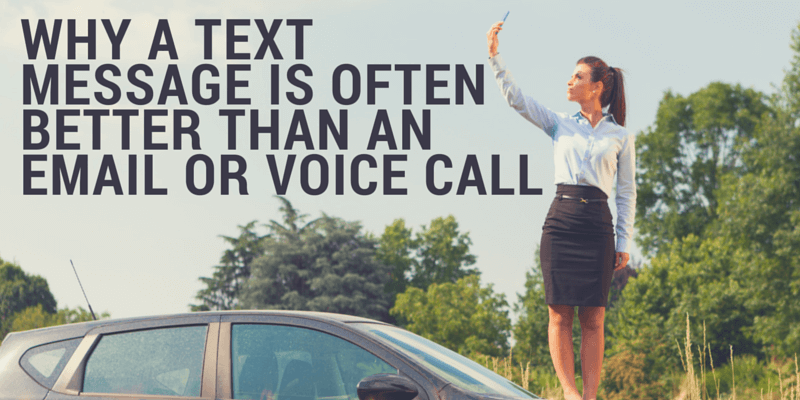When disaster hits, it’s better to send an SMS message

In the aftermath of the Boston Marathon Bombings, the mobile networks were flooded. Four days later during the near day-long manhunt in a suburb of Boston, the networks in that area were hit hard again. It was a similar situation in 2005 with the London bombings. Whether natural or man-made, major disasters are times when mobile networks are put to the test.
And in those times there just isn’t enough capacity available when everyone tries to call their friends and loved ones. But SMS messages will get through. How? To answer that question, I’ll quote from Scientific American interview with Brough Turner. He’s an engineer and entrepreneur in mobile networking. In the interview he discusses the impact on the networks after the Boston Marathon Bombings and answers the question why sending an SMS is better than calling:
“The SMS messages have a relatively light footprint, first of all. The second thing is that they’re asynchronous. If they can’t get through this instant, they keep trying. If it gets over the radio to the cell site, it will get through. Even if it’s delayed for 30 seconds or something. With voice you’re either connected or you’re not, and when you are that means that the traffic channel is tied up until you’re done talking. More likely, it means you never get connected because traffic channels are already saturated.”
Basically, because of how an SMS message is sent you are almost always guaranteed it will arrive. It may not be as instantaneous as we’ve come to expect, but it will get there. Whereas a voice call probably won’t connect when there’s a high demand on the network.
And honestly, in an emergency or mass disaster, a short text message from a loved one can be enough to put you at ease. My step-son was a teenager living with his mother in that Boston suburb during the manhunt. We worried about his safety and whether or not he was home, or if he was in the area where the police were most active. His father did eventually get a text message from him saying he was home safe. That’s all we needed to know. One short message that made it through the network load comforted us.
While I hope you never experience something similar, please remember to use an SMS message rather than call your loved ones. They’ll thank you for it.
Related Articles
Why SMS Technology Still Dominates in The Digital Age
SMS was once considered to be a dead technology, but the humble text message has proved it’s around for the long haul. And what with Nokia reintroducing the iconic 3310 with its never-ending battery life and non-smart interface, straightforward texting fits right into our busy lifestyles.
Why a Text Message is Often Better Than an Email or Voice Call
A text message is a very small and condensed piece of communication in contrast to voice messaging or video broadcast. Consequently text messages can get through when network capability is degraded to an extent that makes other options unviable.
Pizza birthed the SMS message
Why SMS Marketing Can Be More Effective Than Mobile Banner Advertising
A recent eMarketer article on the effectiveness of mobile banner advertising reports the main reason people don't click is because they aren't interested in the offer. In fact, only 24% of those surveyed say they clicked on a mobile banner on a website in the last three months.
12 Reasons Mobile Messaging is “A Beautiful Thing”
Beauty is in the eye of the beholder. But could text messaging really be considered beautiful? You might argue that it depends on the messages you get! That’s a valid approach, but I recently found a description of mobile messaging that made me believe it is indeed beautiful, so I thought I’d share it with you.
fastsms profiled in 60 seconds
A Brief History of the SMS Text Message
Despite the surge in popularity of smartphones over recent years and the rapid growth of alternative messaging apps, SMS messaging remains one of the most commonly used and popular methods of communication today. Read this article to learn more about the history of SMS messaging and discover why it is still a highly profitable channel that should be seriously considered in your marketing strategy.
The 4 Parts of an SMS Message
The great thing about SMS messaging is how simple it is. You just type, click send, and the other person gets the message almost instantly. But there’s more going on in that simplicity than you might realise. Each message has different parts. Let’s look at them individually so you’ll understand everything that goes into your message when you hit “send”.












